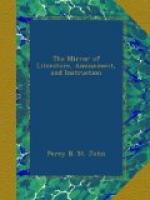W. PULLEN.
* * * * *
LUDICROUS BLUNDERS.
(From “After Dinner Chat,” in the New Monthly Magazine.)
H.—How completely a fine poetical thought may be destroyed by the alteration of a single word! I recollect a ludicrous instance of this. I was quoting to M—d—y, who is rather deaf, a line of Campbell’s, as being, in my opinion, equal to any that ever was produced:
“And Freedom shriek’d—as Kosciusko fell.”
“I dare say you are right,” replied M—d—y; “but it does not quite please me: I must think of it.” And he repeated—
“And Freedom squeak’d—as Kosciusko fell.”
F.—L—ml—y, of the —th Dragoons, was, as you may remember, a great admirer of the “Hohenlinden” of the same poet, and used frequently to recite it; but instead of
“Wave, Munich! all thy banners wave!
And charge with all thy chivalry,”—
fancying, no doubt, that the poet, from ignorance of military terms, had committed a blunder, he used invariably to say—
“And charge with all thy cavalry.”
K.—I once heard two whimsical blunders made in the course of a performance of Macbeth, at a poor little country theatre. The Lady Macbeth—who, not unlikely, had been a laundress—instead of saying merely
“A little water clears us of this deed,”
chose to “make assurance double sure,” and said—“A little soap and water.” And, presently after, for
“We have scotch’d the snake, not killed it,”
the Thane, looking with an air of profound mystery at his tender mate, whispered her,
“We have cotch a snake, and killed it.”
* * * * *
PARLIAMENT OF BATTS.
Gurdon, in his History of Parliament, says—“This parliament was summoned in the reign of Henry the Sixth, to meet at Leicester; and orders were sent to the members that they should not wear swords; so they came to parliament (like modern butchers) with long staves, from whence the parliament got the name of The Parliament of Batts; and when the batts were prohibited, the members had recourse to stones and leaden bullets. This parliament was opened with the Confirmation of Liberties.”
P.T.W.
* * * * *
WITENAGEMOTES.
“Alfred, with the advice and consent of his Witas, in Witenagemote, made his code of law that was common to the whole nation, and enacted that a Witenagemote should be held twice a year, and oftener if need were.”—See Gurdon on Parliament.
P.T.W.
* * * * *




